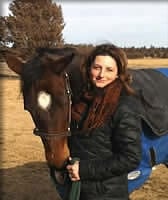EOTRH: Facing a Scary-Sounding Dental Disease

Q. My veterinarian pointed out inflammation along my 13-year-old gelding’s front teeth, as well as some small red spots (she called it stippling) on his gums and under his lips. She said it could be an early sign of a dental disease with a very long (and scary-sounding!) name. She explained that we would keep an eye on any dental changes during future wellness exams and that he might need radiographs of his mouth. Is there anything I’ve done wrong that’s led to my horse having this problem, and is there anything I can do to prevent it from becoming worse?—Jacquelyn, Washington
A.
Equine odontoclastic tooth resorption and hypercementosis is probably the tongue twister of a disease that your veterinarian was referring to, which we often abbreviate as “EOTRH.” This is a fairly recently recognized disease that can cause severe changes to the tooth roots and surrounding gingiva (gums) in older horses, most often in the incisors and canines, although some very new research indicates it can affect their premolars and molars, as well. In moderate and severe cases it results in chronic infection of the tissues and is very painful to the horse; it can also cause loss of affected teeth or enough pain that they must be extracted to allow the horse to eat comfortably.
The cause of EOTRH is not known for certain, though it appears to be correlated with equine pituitary pars intermedia dysfunction (PPID, or equine Cushing’s disease), a history of overly aggressive dental procedures by improperly trained individuals, horses that are not allowed to graze (i.e., kept on a drylot), and the presence of certain types of bacteria or other microorganisms in the mouth. Geldings seem to be predisposed. It’s theorized that saliva constantly bathing the teeth, as occurs in the head-down grazing position when horses are at pasture for many hours per day, may be protective, so incorporating this into your horse’s management program might be helpful.
The earliest externally visible signs of EOTRH are gingivitis (inflammation of the gums around the teeth) or small draining tracts from the roots of the tooth that look like pimples in the gingiva—these appear as tiny red dots initially. These might occur years before the more obvious loosening of teeth or tooth root enlargements, and your veterinarian should take note of this during routine dental examinations. Dental radiographs taken at that time might show the start of small resorptive (bone breakdown) lesions in the tooth root or the laying down of cementum around the roots, which is the body’s attempt to stabilize the teeth.
Unfortunately, there is currently no known specific treatment to prevent or slow down disease progression, although early identification allows more proactive care and can prevent your horse from experiencing chronic pain and complications such as chronic infections. When the affected teeth become painful or loose, veterinarians recommend extraction. Often, if all or most of the incisors are affected, the veterinarian removes them completely. While it seems like a drastic measure, owners find that their horses recover quickly, are much more comfortable afterward (with previous hard keepers often gaining weight more easily), and can still graze grass effectively!

Written by:
Wendy Krebs, DVM
Related Articles
Stay on top of the most recent Horse Health news with











